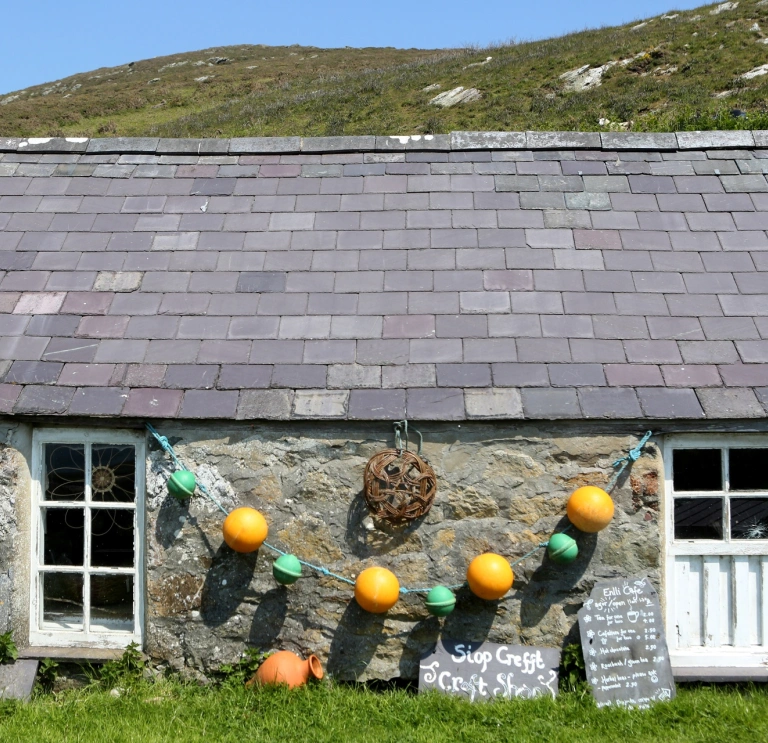Here are some lesser-known places along The Coastal Way that we’ve discovered on our travels. We've put them in order running from top to bottom, but it's up to you whether you explore them that way or just pick and choose!
Ynys Enlli (Bardsey Island)
Ynys Enlli (Bardsey Island) is the 'island of 20,000 saints', who are supposedly buried here, far outnumbering the handful of living souls who live on the island these days. It's always been a place of refuge, retreat and pilgrimage, and is the end point of the North Wales Pilgrim's Way. In 2023 it became the first site in Europe to be awarded International Dark Sky Sanctuary certification, joining just 16 other sites worldwide. Between March and October you can hop on a boat for a day trip to explore the island's amazing bird and sealife.
Read more: The remarkable pull of Enlli


Plas Glyn y Weddw
This Gothic Victorian mansion near Pwllheli was built in the 1850s to house the widowed Lady Elizabeth Love Jones Parry and her art collection. It was rescued from near-dereliction in the 1970/80s and restored into the superb Oriel Plas Glyn Y Weddw gallery, which shows lots of high-quality contemporary art. There’s also a café, open-air theatre, woodland walks, and you can stay in considerable luxury in the rear wing.

Hell’s Mouth
Or to give it its correct Welsh title, Porth Neigwl. But we can see why it got the nickname. The gaping jaws and four-mile sands face straight into the Atlantic sou’westerlies, which made it a nightmare for sailors of old - but it’s heaven for surfers today. If you're not an experienced surfer though, be careful. Depending on the conditions it can be quite rough and there are no lifeguards. The waves get progressively bigger as you move northwards along the beach.


Borth beach
Ceredigion’s longest beach runs for three miles (5km) up from Borth to the sand dunes of the Dyfi National Nature Reserve which form part of the Dyfi Biosphere. You can find out more at the Ynyslas Visitor Centre. The ebbing tide reveals the gnarled stumps of a 5,000-year-old forest. This, according to local legend, is Cantre'r Gwaelod (the ‘lower hundred’), an ancient kingdom that was swamped when the gatekeeper Seithennyn got drunk and forgot to shut the flood gates.
Read more: Discovering wildlife in the UNESCO Dyfi Biosphere

Ynyshir
Queen Victoria once owned Ynyshir Hall as her coastal retreat. Its grounds are now the RSPB Ynys-hir Nature Reserve, and the house is Ynyshir (they’ve dropped the ‘Hall’ bit), a two Michelin-starred restaurant-with-rooms. The food is extraordinary: chef-owner Gareth Ward’s intricate taster-menus mix local and international flavours with considerable panache.



Aberaeron
Most of our harbour towns grew organically around natural creeks and inlets over centuries, but Aberaeron was built from scratch in the early 1800s. A fine set of Regency buildings line the harbour, made all the prettier by their patchwork paint jobs. It’s a busy little town, especially during the summer.
Read more: Cardigan Bay coastal adventures

Pwll y Wrach
Pwll y Wrach or the Witches’ Cauldron is one of the Pembrokeshire coast’s most startling sights: a giant crater formed by a collapsed cave, connected to the sea by a tunnel. The coast path takes you directly over the arch; kayakers (and seals) take the subterranean route to land on a shingle beach inside the crater.
Read more: Explore caves in Wales

Melin Tregwynt
There’s been a woollen mill in this little wooded valley since the 17th century, when local farmers brought their fleeces to be spun into yarn and woven into blankets. Owned by the same family since 1912, Melin Tregwynt still makes fabrics in the traditional way. So far, so quaint – but it’s their very contemporary eye for design that has made them a favourite of hip hotels and fashionistas.
Read more: Get creative with hands-on heritage crafts



Dr Beynon's Bug Farm
The entomologist, insect farmer and TV presenter Dr Sarah Beynon runs this working farm, research centre and visitor attraction just outside St Davids. The Bug Farm has plenty of serious scientific messages about ecology and sustainability, but it’s also a huge amount of fun, especially if you’ve got kids. The café’s menu includes lots of edible insects, naturally.






